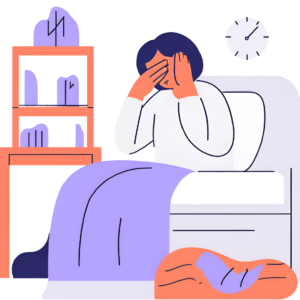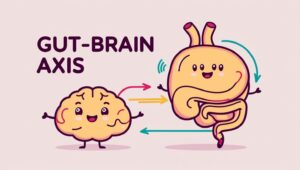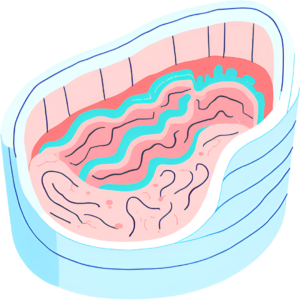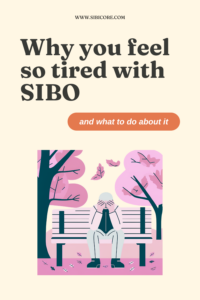Are you wondering why you’re feeling so exhausted, literally all the time, while suffering from SIBO? You’re not alone. I made a blog post to explain why you might feel tired with SIBO and what you can do about it. So you can hopefully get to a state where you’re feeling a little better.

What Is SIBO and How Does It Impact Your Body?
If you’ve been diagnosed with Small Intestinal Bacterial Overgrowth (SIBO), you might already be familiar with is most common symptoms, such as: bloating, cramping or diarrhea / constipation. But what is actually going on the inside of your body? SIBO occurs when bacteria that are normally in your large intestine migrate to your small intestine, where they don’t belong.
The small intestine usually only has few bacteria, because of processes that protect the organ from them. Like a strong immune response, stomach acid and the gut movement itself. (These are literally the peristaltic movements moving our food forward also push out bacteria). When something happens that unsettles these protections, the small intestine becomes a breeding ground for bacteria (1). In the case of an overgrowth, the abnormally large amount of bacteria in the small intestine can disrupt a long list of processes within your body, digestion being one of them.

However, this bacterial overgrowth doesn’t just disrupt your digestion. It also interferes with nutrient absorption, leaving your body struggling to get the energy it needs. Plus, the gut-brain connection means that what happens in your gut can influence how you feel physically and mentally, explaining why fatigue is such a common complaint for people with SIBO.
The Science Behind Fatigue and SIBO
Fatigue doesn’t just “happen”—it’s often the result of an imbalance somewhere in your body, and SIBO is no exception. There are two main reasons why fatigue is such a big symptom for many SIBO sufferers.

Nutrient deficiencies (due to malabsorption)
Nutrient deficiencies are a major player, with B12 and iron deficiencies being especially common due to vitamin & nutrient malabsorption. Without these major nutrients, your energy levels can plummet. So why is that?
- Early fermentation: the small intestine usually has very few bacteria, so nutrients from food can be broken down and absorbed efficiently. However, because of SIBO the bacteria ferment carbohydrates before nutrients are absorbed and the leftovers have moved to the large intestine.
Bacterial fermentation refers to the process where bacteria break down carbohydrates (like sugars and fibers) into simpler things. This process messes with your digestion, because the compounds that are being created are gases or byproducts that may cause inflammation. These in turn, cause bloating, cramping, and other uncomfortable symptoms. But it doesn’t stop there. This disruption in your gut can have ripple effects on your whole body, making you feel sluggish and out of balance (2). - Nutrient competition: What’s worse, these bacteria don’t just cause discomfort. They compete with your body for important nutrients like vitamins, minerals, and even energy from food. Over time, this can lead to nutrient deficiencies, leaving you feeling constantly tired and struggling to keep up with daily life.
To summarise: bacteria start fermenting before you have absorbed the good parts of your food & they even eat your food too!! This can lead to deficiencies and unsurprisingly, that may make you feel exhausted.
Inflammation

When bacteria overgrow in the small intestine, they can trigger an inflammatory response in the gut lining, making the symptoms of SIBO even worse. While not everyone with SIBO experiences this, the overgrowth of bacteria can sometimes lead to microscopic inflammation in the mucosa of the small intestine. This inflammation further irritates the gut, potentially worsening the other issues.
When you combine all of these factors, it’s easy to see how SIBO becomes sad mix for chronic fatigue.
Common Triggers Worsening Fatigue in SIBO Sufferers
Do you feel even more tired with SIBO on some days? It’s not just in your head—there are real triggers that can worsen fatigue when you’re dealing with SIBO, usually because they make the small intestine an even better breeding ground for bacteria.
-
- Poor dietary habits: Consuming high-sugar or high-FODMAP foods can fuel bacterial overgrowth, leading to worse symptoms. Still, it might not be the best thing to stop eating FODMAPs while treating SIBO, which you can read more about here.

- Poor dietary habits: Consuming high-sugar or high-FODMAP foods can fuel bacterial overgrowth, leading to worse symptoms. Still, it might not be the best thing to stop eating FODMAPs while treating SIBO, which you can read more about here.
-
- Stress: Chronic stress slows down your gut motility, making it easier for bacteria to thrive where they shouldn’t.
-
- Lifestyle factors: Irregular sleep schedules or a low-movement lifestyle can worsen the already overwhelming exhaustion. It is an obvious thing to note this maybe, but I looked into my own life. I was exhausted with SIBO, so much so, that I could barely get out of bed, which in turn just made me feel worse. Please try to find some things that give you energy, even if it’s a short walk in fresh air.
How to Manage Fatigue When Living with SIBO
The good news? There are practical ways to combat fatigue and start feeling like yourself again.
-
- Dietary changes: Focus on a low-FODMAP or anti-inflammatory diet to minimize bacterial growth and improve nutrient absorption.
-
- Targeted supplements: Digestive enzymes and vitamins (like B12) can address deficiencies and support gut health. A doctor should be able to help you figure out if you’re low in any specific vitamins.
-
- Sleep and stress management: Prioritize a consistent sleep routine and explore stress-reducing practices like meditation or yoga to support your general wellness.

Sometimes, fatigue can signal that SIBO is progressing or maybe something else is going on, like Chronic Fatigue Syndrome or Cystic Fybrosis. So please reach out to a health care provider who can help you figure out what’s going on, if you feel like it’s not getting better.
Conclusion on why you feel tired with SIBO
If you’ve been feeling endlessly tired while battling SIBO, you’re not alone. There are steps you can take to regain your energy. Whether it’s adjusting your diet, managing stress, or seeking professional support, every small step makes a difference. Knowing and understanding why you’re feeling so tired is a good step to start, because it enables you to look at yourself with more kindness.

